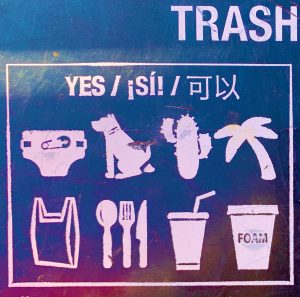How to do your garbage right: Tips from our Speaker Series “Trash Talk” experts, and the RECORDING of the presentation

 If you took away nothing else from COSF’s March 29 Speaker Series panel “Talkin’ Trash: How to Do Your Garbage Right,” we hope you at least memorized these three numbers: 1-2-5.
If you took away nothing else from COSF’s March 29 Speaker Series panel “Talkin’ Trash: How to Do Your Garbage Right,” we hope you at least memorized these three numbers: 1-2-5.
Those represent the types of single-use plastics that actually are recyclable. If you see a 1, 2 or 5 inside the chasing arrows on a container, it goes into the blue bin, along with paper, clean cardboard, glass and cans. As moderator Joanie Burns, Amgen sustainability manager, pointed out, not everything that’s marked as recyclable can be recycled. Containers or packaging with the numbers 3, 5, 6 and 7 inside the arrows need to go into the black trash bin that goes to landfill. Keep in mind also that plastic and plastic mesh bags are not recyclable and need to go in the trash.
Panelist Athens Services territory manager Matt Trouts gave a upbeat assessment of how Thousand Oaks residents have complied with the new recycling and organics rules in Athens’ first year of providing service to the area. “T.O. is doing an amazing job with recycling,” he said. “T.O. has rocked the organics,” referring to the mandate of the California law SB 1383 to reduce climate pollution caused by rotting food and yard waste going into landfill.
Trouts reports that since the start of 2023, when the food-waste-reduction law went into effect, that Athens has diverted 3,400 tons (that’s 6.8 million pounds) of food waste. And in the first full year of service, Trouts says Athens kept 25,000 tons (50 million pounds) of green waste out of the landfill. The result, besides improving air quality by reducing methane emissions, has been 60 tons of free organic compost for the community. (You can pick some up at the city’s Arbor Day event on April 15. Bring your own bag or bucket.)
City of Thousand Oaks City Sustainability Department assistant analyst Philip Hirrel noted that another of the city’s initiatives to reduce food waste is surplus food recovery, which he is looking forward to expanding in 2024 as restaurant participation begins. One mandated goal of SB 1383 is to redirect 20% of edible food currently thrown away to people in need by 2025.
Hirrel also noted that the city is working hard to enforce last year’s local ordinance banning single-use polystyrene. The ban affects rigid polystyrene used to make disposable cutlery, clamshell food containers and expanded polystyrene (EPS) products such as foam cups, plates, clamshell food containers, packing peanuts, body boards and ice chests. (Polystyrene is labeled 6 inside the chasing arrows.)
View the recording of the presentation here



0 Comments